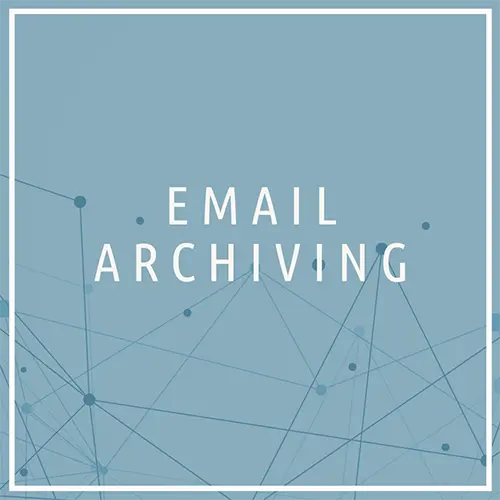Email Archiving
In 2022, a wealth of different communication media are available to facilitate and enrich everyday life. At the top of the list are social media. Nevertheless, email is still the number one medium when it comes to corporate communication. However, as with any communication medium that is used for business purposes, there are also legal requirements for emails, especially when it comes to archiving them. This article explains what email archiving is all about, what needs to be considered and how email archiving works.
What is email archiving?
Email archiving describes a process in which electronic correspondence within a company that originates via email is archived or stored in an archiving system. Email archiving covers a special area of digital or electronic archiving. It is thus a sub-discipline of the topic “archiving”.
The goal of email archiving is both the storage of internal company data for personal use and the compliance with legally prescribed storage obligations and periods. In addition, emails have now largely replaced traditional correspondence by letter and fax, which is why they are often the only evidence of business communication. It is therefore important and necessary to document and archive this correspondence. According to German law, if the legal requirements for email archiving are not followed or the storage obligation is not complied with, this can mean a breach of the record-keeping and accounting obligations. This in turn can result in tax penalties as well as legal consequences and even be punishable by imprisonment.
Archiving is the permanent as well as unchangeable storage of documents and data according to a controlled, systematic process.
Which emails have to be archived and what are the legal foundations?
The answer to the question of which emails must be stored according to the German legislator is: it depends. The basis for the rules on email archiving are the “principles for the proper keeping and storage of books, records and documents in electronic form and for data access” (GoBD), which in turn refer in particular to the German “Handelsgesetzbuch” (HGB) and the German “Abgabenordnung” (AO). In addition to these laws, however, depending on the industry and legal form of the company, other laws may apply, such as the “Umsatzsteuergesetz” (UstG) or the “Aktiengesetz” (AktG). There is, however, no special law explicitly governing the archiving of emails.
Requirements according to the German Tax Code (AO)
The prerequisite for the archiving obligation of emails is the classification of an email as a business or commercial letter. Whether an email corresponds to a commercial letter, however, depends on its content and purpose. According to the AO, all emails must be archived if they are relevant for tax purposes. This is the case for documents with the following content:
- Annual financial statements, commercial books, management reports, inventories, the opening balance sheet as well as the work instructions and other organisational documents required for their understanding
- Received commercial or business letters
- Reproductions of commercial or business letters sent out
- Accounting vouchers
- Other documents, insofar as they are relevant for taxation
Requirements according to the German Commercial Code (HGB)
The HGB, on the other hand, classifies as commercial letters all emails (including file attachments) that can be understood as business correspondence of a company. For example, emails with the following content are considered relevant for business purposes:
- Emails regarding transactions carried out and their completion, including contracts, order confirmations, invoices, delivery documents and payment vouchers
- Emails regarding cancelled or prepared transactions, incl. order changes, letters of complaint and contact with (potential) customers by the sales department
In summary, this means that all emails with tax or business relevance are subject to retention and must be archived. It does not matter whether the emails are received or sent. Conversely, this also means that all emails without tax or business relevance do not have to be archived. This includes newsletters, unsuccessful offers, brochures, advertising flyers or spam mails.
Caution: Not all emails in the company may be archived. Emails that are subject to the General Data Protection Regulation (GDPR) require the express consent of the respective employee and may not be stored in the archiving system without further ado.
A business letter (commercial letter) is any correspondence that has as its object the preparation, execution or cancellation of a transaction or a commercial transaction. However, the term “business letters” includes not only letters in the traditional sense, i.e. documents sent by post, but also electronic messages: Emails, faxes, telegrams etc. Correspondence that has not led to the conclusion of a transaction is not a commercial/business letter.
Source: IHK 2022
How long do you have to archive emails?
When archiving emails in compliance with the law, it depends on their purpose and content, as already described above. The retention period of emails also depends on this. Basically, HGB § 257 defines that all emails that are considered commercial letters must be archived for 6 years. Nevertheless, this period can also be extended to 10 years if the emails contain documents such as annual financial statements, opening balances or accounting vouchers.
Since the separation of emails according to their content or purpose as well as their retention period involves a not inconsiderable additional effort, many companies archive all their relevant emails for ten years from the outset. The start date for the retention period is always the end of the calendar year in which the corresponding email was received or sent.
How does email archiving work?
Printing out emails, filing them away and putting the folder in the filing cabinet no longer works so easily today. When it comes to the type of email archiving, it is important that it complies with the legal regulations and is compliant with the German GoBD. This means that the documents must be kept in their original format, i.e. emails in electronic form. However, in the case of audit-proof archiving of emails, there is no prescribed “location” where the emails must be stored. Accordingly, this can be either the local company server or a cloud-based platform. Nevertheless, there are strict standards for audit-proof archiving. According to these, all relevant records must be filed…
- complete,
- properly,
- correct,
- up-to-date,
- unalterable,
- comprehensible,
- and verifiable.
Transferred to email archiving, this means that:
- Every email is archived in an unchangeable way and can be retrieved exactly in this state.
- No email may be lost during transfer to the archive or in the archive itself.
- Every email in the archive must be retrievable in a timely manner.
- No email is deleted before the expiry of the retention period.
- All actions and changes in the archive must be precisely logged so that the original state can be restored.
- No information may be lost during an archive system migration.
In order to guarantee secure email archiving and thus meet the requirements of the GoBD, many companies rely on external providers and solutions. Microsoft 365 provides an email service in the cloud with Exchange Online. Microsoft 365 offers the advantage that email archiving is directly integrated into the solution. Depending on compliance requirements, Microsoft 365 offers various email archiving scenarios. It is advisable to involve a specialised Microsoft partner in such a project.
*Legal Notes
All information in this article is for information purposes only. It does not constitute legal advice. In particular, it cannot replace individual legal advice that takes into account the specifics of each case. Insofar as we report on cases, in particular court decisions, their results may not be used to infer a necessarily similar outcome in other cases.
We endeavour to select all information provided in this article with care and to update or supplement it as necessary. However, we cannot guarantee that the information in this article is up-to-date, complete or correct. This applies in particular to changes in legislation or case law.
Hamburg, August 01, 2022
Author: Sara Glöckner
Category: Business Wiki
You like what you read? Please feel free to share this article:







